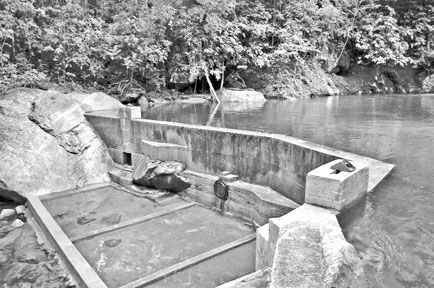Panasian Power makes its mark in local mini-hydropower development
Panasian Power Limited (PPL), a fully owned subsidiary of Power Hub
International, Malaysia, is helping to meet the demand for clean,
low-cost energy in Sri Lanka through its mini-hydropower plant in the
Ratnapura District.
Since incorporation as a Board of Investment registered company in
2002, PPL has been part of the drive to develop the small and
mini-hydropower industry in Sri Lanka, owning and operating a 2.0
megawatt mini-hydropower plant in the Ratnapura District which provides
electrical energy exclusively to the Ceylon Electricity Board (CEB).
 |
|
A mini-hydropower plant
in the Ratnapura District. |
The overall efficiency of the plant is a record high 60 percent. The
company is in the process of negotiating the acquisition of a second 2.4
megawatt mini-hydropower project in Nuwara Eliya.
The power generation policy of the mid 1990s encouraged private
sector participation, leading to independent power producers (IPPs) such
as Panasian Power Limited to supplement local power generation through
the establishment of small and mini-hydro plants.
These grid-connected small and mini-hydro plants are some of the most
environmentally friendly energy sources available to Sri Lanka. Since no
water is stored in a reservoir and the water is fed back to the same
stream a short time after its diversion and generation of power, there
is negligible impact on the environment.
Chairman of the PPL Board of Directors, Dr. Prathap Ramanujam said,
"Hydroelectricity as a clean, domestic and renewable source of energy
offers immense benefits to Sri Lanka.
It has advantages over other energy sources, particularly in terms of
efficiency and its limited impact on the environment.
Panasian Power is committed to harnessing this natural resource to
enable an energy-secure future for the Sri Lankan people." In 1992, as
the Director General of the Secretariat for Infrastructure Development
and Investment, Dr.Ramanujam initiated the first mini-hydropower project
and the first private thermal power project in Sri Lanka.
Non-polluting
Hydroelectricity is a nonpolluting source of electricity as there are
no emissions released by the burning of fuels.
Therefore, the PPL mini-hydropower generation project qualifies for
the emission credits offered via the Kyoto Protocol which aims to lower
global greenhouse gas emissions.
The emission credits are available to countries and projects that
limit or avoid the emission of greenhouse gases and can be sold in the
open market to countries below the specified emission targets.
This financial incentive is a substantial opportunity to further
realise the income and value of PPL's hydroelectricity project. Power
Hub International is a subsidiary of Malaysia's Majulia Group.
Established in 1985, and in line with its corporate mission to
participate actively and effectively in local and in international
business, particularly the construction industry, Majulia, as a new
organisation, stepped ahead to register itself as a Class A Contractor
in 1995.
Since its inception, Majulia has completed both large and small
projects from small sites developments to massive government and private
sector projects.
Under the Malaysian Government's Small Renewable Energy Program, the
company was the first to undertake the development of a mini-hydro plant
in Malaysia, while venturing into other power generation projects to
expand its stake in the renewable energy industry.
This same expertise is at the forefront of efforts by Panasian Power
to develop the use of renewable energy in Sri Lanka.
|

